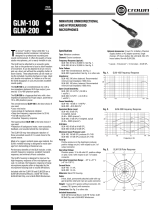Genelec 8331A Operating instructions
- Category
- Musical Equipment
- Type
- Operating instructions
This manual is also suitable for
Genelec 8331A is a high-quality active monitor designed for professional monitoring in audio production, mixing, and mastering applications. With its coaxial design, directivity control waveguide, and smart active monitor technology, it delivers detailed and accurate sound reproduction. Connect it to your audio sources via balanced analog or AES/EBU digital inputs. Utilize the GLM software and control network for automated acoustic calibration, ensuring optimal sound performance in your room.
Genelec 8331A is a high-quality active monitor designed for professional monitoring in audio production, mixing, and mastering applications. With its coaxial design, directivity control waveguide, and smart active monitor technology, it delivers detailed and accurate sound reproduction. Connect it to your audio sources via balanced analog or AES/EBU digital inputs. Utilize the GLM software and control network for automated acoustic calibration, ensuring optimal sound performance in your room.








-
 1
1
-
 2
2
-
 3
3
-
 4
4
-
 5
5
-
 6
6
-
 7
7
-
 8
8
Genelec 8331A Operating instructions
- Category
- Musical Equipment
- Type
- Operating instructions
- This manual is also suitable for
Genelec 8331A is a high-quality active monitor designed for professional monitoring in audio production, mixing, and mastering applications. With its coaxial design, directivity control waveguide, and smart active monitor technology, it delivers detailed and accurate sound reproduction. Connect it to your audio sources via balanced analog or AES/EBU digital inputs. Utilize the GLM software and control network for automated acoustic calibration, ensuring optimal sound performance in your room.
Ask a question and I''ll find the answer in the document
Finding information in a document is now easier with AI
Related papers
-
Genelec 8361, 8351 and 7382 Immersive System Operating instructions
-
Genelec 8341 and W371 Stereo System Operating instructions
-
Genelec 8331A SAM Studio Monitor Operating instructions
-
Genelec 8350 APM Owner's manual
-
Genelec 8351 and W371 Stereo System Operating instructions
-
Genelec 8351 and W371 Stereo System Operating instructions
-
Genelec 1238AC SAM Studio Monitor Operating instructions
-
Genelec 1238A SAM Studio Monitor Operating instructions
-
Genelec 1234A SAM Studio Monitor Operating instructions
-
Genelec 8341 and 7370 Stereo System Operating instructions
Other documents
-
Meyer Sound HIGH DEFINITION AUDIO MONITOR HD-1 User manual
-
Bose F1 Model 812 Flexible Array loudspeaker Owner's manual
-
 Crown Audio GLM-200 User manual
Crown Audio GLM-200 User manual
-
Bose F1 Model 812 User manual
-
Bose Professional 731419-1110 User manual
-
König CMP-FTP5R305 Datasheet
-
König CMP-SFTP5R305 Datasheet
-
König CMP-CE050/15 Datasheet
-
König KN-LSP05R-15 Datasheet
-
Crown LM-300AL Application Manual








